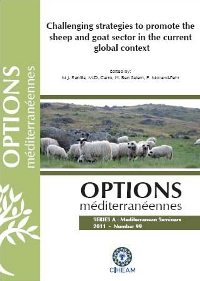| Article précédent | p. 219-222 | Article suivant |
Effects of the inclusion of Knautia arvensis in the concentrate for fattening lambs on feed intake, digestibility and growth performances
Knautia arvensis has shown antiproteolytic activity on ruminal fluid in vitro, suggesting a potential use as a natural plant additive to decrease feed protein degradation in the rumen. In the current experiment, twenty-four Assaf lambs (15.0 ± 0.38 kg) were used to investigate the effects of the inclusion of 12 percent of K. arvensis in the concentrate on feed intake, digestibility and animal performance. Animals were allocated into two groups (Control and Knautia) and fed concentrate and barley straw ad libitum. From day 21 to 27 of the experimental period, a digestibility trial was conducted using 4 lambs per group. Lambs were slaughtered when they reached 25 kg. No negative effects were observed on feed intake (P>0.05) (average concentrate and barley straw intakes of 791 and 35 g/day, respectively). Likewise, dry matter, fibre and crude protein digestibilities resulted statistically unaffected (P>0.05). There were no effects of K. arvensis on growth rate and feed to gain ratio (P>0.05), and similar carcass weights and killing out percentages were observed (P>0.05). In conclusion, regardless of its potential as an antiproteolytic agent, the inclusion of K. arvensis in the concentrate had no significant effects on feed utilization and performance of growing-fattening lambs.
Knautia arvensis a une activité antiprotéolitique dans le liquide du rumen in vitro. Vingt quatre agneaux de race Assaf ont été utilisés pour étudier l'effet de l'incorporation de 12 pour cent de K. arvensis dans le concentré, sur l'ingestion, la digestibilité et la croissance. Ces animaux ont été répartis en deux groupes et ont reçu du concentré et de la paille d'orge à volonté. Un essai de digestibilité a été mené sur quatre moutons de chaque groupe entre le 21ème et le 27ème jours de la période expérimentale. Les agneaux ont été abattus lorsqu'ils ont atteint un poids vif de 25 kg. Aucun effet négatif n'a été détecté sur l'ingestion du concentré (791 g/jour) et de la paille (35 g/jour). La digestibilité de la matière sèche, des glucides pariétaux et des matières azotées totales, le gain moyen quotidien et l'indice de consommation n'ont pas été affectés par l'incorporation du K. arvensis dans le concentré. Le poids et la longueur de l'animal ainsi que le rendement commercial ont été similaires entre les groupes d'agneaux. En dépit de son activité antiprotéolytique démontrée auparavant dans un essai in vitro, l'incorporation de K. arvensis dans le concentré s'est avérée sans effet sur l'ingestion, la digestion et la croissance des agneaux à l'engrais.
- [ Afficher ]
- [ Télécharger ]
- [ Exporter la citation ]
Vous pouvez télécharger la citation au format :
- [ Imprimer ]
-
Mots-clés
AGNEAU, ALIMENT CONCENTRE POUR ANIMAUX, DIGESTION DU RUMEN, PROTEOLYSE, SCABIOSACiter cet article
Bodas R., Giráldez F.J., Rodríguez A.B., Wallace R.J., González J.S., López S. Effects of the inclusion of Knautia arvensis in the concentrate for fattening lambs on feed intake, digestibility and growth performances. In : Ranilla M.J. (ed.), Carro M.D. (ed.), Ben Salem H. (ed.), Morand-Fehr P. (ed.). Challenging strategies to promote the sheep and goat sector in the current global context. Zaragoza : CIHEAM / CSIC / Universidad de León / FAO, 2011. p. 219-222. (Options Méditerranéennes : Série A. Séminaires Méditerranéens; n. 99). 13. International Seminar of the Sub-Network on Nutrition of the FAO-CIHEAM Inter-Regional Cooperative Research and Development Network on Sheep and Goats, 2009/10/14-16, León (Spain). http://om.ciheam.org/om/pdf/a99/00801559.pdf



